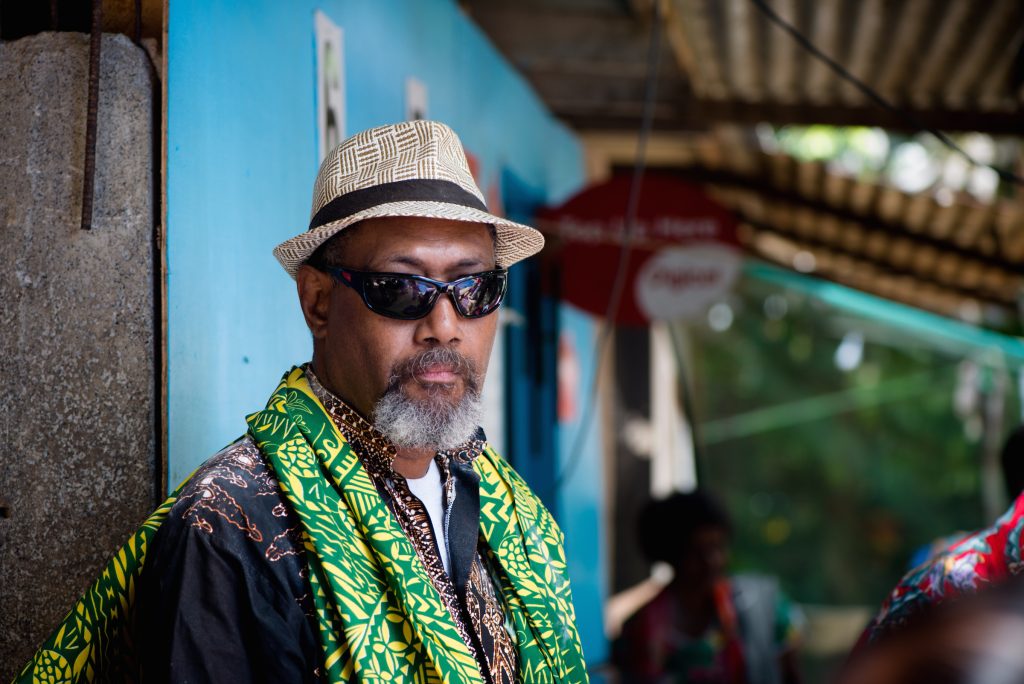
Jean Sese, lifetime public servant, passed away on November 8, 2013, aged 55
[Originally published in the Vanuatu Daily Post]
I last saw Jean Sese a few hours before he suffered a fatal heart attack. He was at his customary seat at chief John Tarilama’s nakamal. We shared a few pleasantries and he was kind enough to chuckle at my feeble humour.
I’d always been nervous around him, and more than a little intimidated, even though he gave me no reason to feel that way. He could be effortlessly charming, even gracious, and if he seemed at all forbidding, it was by virtue of his implacably calm demeanour. He was a deep current untouched by storms. And in a country often roiled by the tempestuous passions of its leaders, his influence was immeasurable.
Vire Dare Naure Jean Sese was director general of the prime minister’s office in Vanuatu for years. I was only two weeks in-country when I first met him. I had been asked to brief the PMO on a matter that required an impartial analysis, and given that I didn’t know jack about Vanuatu at the time, I was as impartial as could be. Mr Sese listened to me patiently for about an hour and a half, asked some pointed, probing questions, then thanked me for my time.
If this is the calibre of the senior civil service, I told myself as I left, then Vanuatu has a lot going for it.
Over the years, I got to see him at work, and came to admire him more than just about any other leader in the country. He was calm, confident –even cool– and one of the very few people in national politics who emerged untainted and admired by all.
Prime ministers came and went, but Jean Sese remained.
He was the anchor to the ship of state. When everyone else was raring for a fight, his cool demeanour prevailed. His quiet, unpretentious and unambitious presence prevented catastrophe on more than one occasion.
A mutual friend recounted the following story: At a particularly contentious moment, several senior government figures were at each other’s throat. One young firebrand, convinced that his character had been sullied, was ready to let rip at the next management meeting. Jean, presiding, glanced about the room, and quietly instructed the man to say the opening prayer. Having asked for forgiveness and grace in light of their collective sins, the young man found his anger had left him completely.
People who came of age during his tenure described him as a mentor, a guardian and a guide through the byzantine workings of Vanuatu politics. In a society so riven by personal jealousy, few indeed have been so universally admired.
A few years ago, Mr Sese suffered a serious stroke. The quiet flurry of concern that rippled through the circles of power was perhaps greater testimony to his influence than anything else. Even more telling: nobody I spoke to saw his sudden departure from the PMO as anything other than incalculable loss.
The cost to the nation was great. While others have since taken up aspects of his role, nobody has succeeded in replacing him.
The personal cost was greater. Mr Sese had been working as a public servant his entire adult life. He was one of the first francophone bureaucrats to occupy a senior position, in spite of the newly independent government’s deep distrust of French influence. While he never seemed to suffer from the overweening ambition that drives so many in Vanuatu to value office over achievement, his role at the centre of the storm clearly defined him.
He returned to the civil service for a period as director general of foreign affairs, where many foreign diplomats learned to value his deep understanding and experience. But the physical cost was high. Even here, at the periphery of power, his limited resources were taxed.
Even from a distance, I found it difficult to witness the effects of his infirmity. While he accepted with stoicism the physical disability imposed by the stroke, the fact that his body could not keep up with his acute intelligence and limitless drive was clearly a source of deep distress for him. This was a man who had once worked tirelessly, rising at 4:00 a.m. or even earlier to prepare himself for each day’s work.
In December of last year, Mr Sese was appointed as an advisor to the PMO. The work seemed to breathe new life into him. He was again able to apply his insight and experience to guiding the nation. Some senior office holders were reported to be immensely relieved to be able to lean on his wisdom once again.
But it was to be a short respite. Jean Sese died on the morning of the November 8th, having suffered a heart attack the night before. If there is any comfort to be had from the knowledge, his passing was mercifully quick. He was active and alert until just a few hours before. He served his nation to the last.
He was given a state funeral at the Chiefs’ Nakamal in Port Vila the following day. Hundreds turned out to pay their respects. His body was then flown to Ambae so that he could be buried on his ancestral land.
For my part, I can only shed a quiet tear. Goodbye, Jean. This country is poorer without you.
